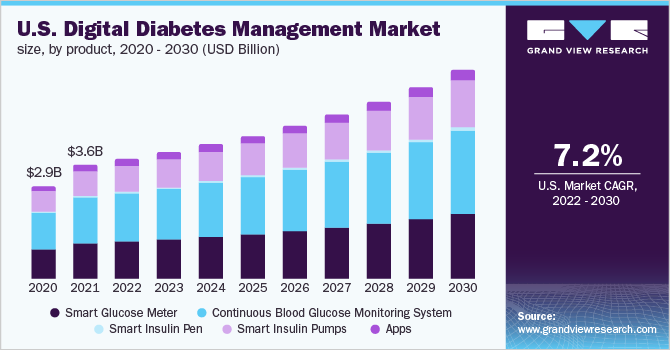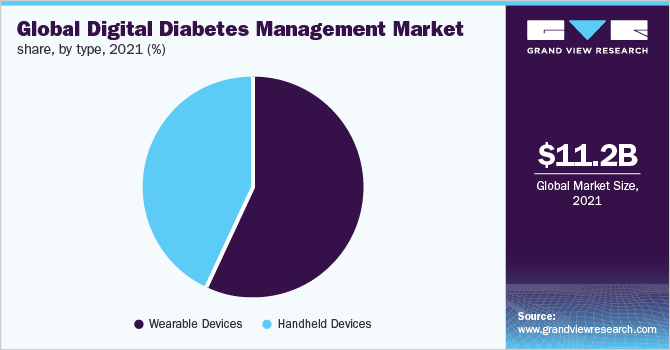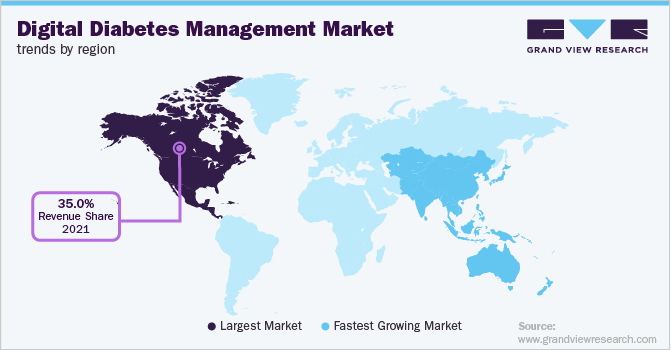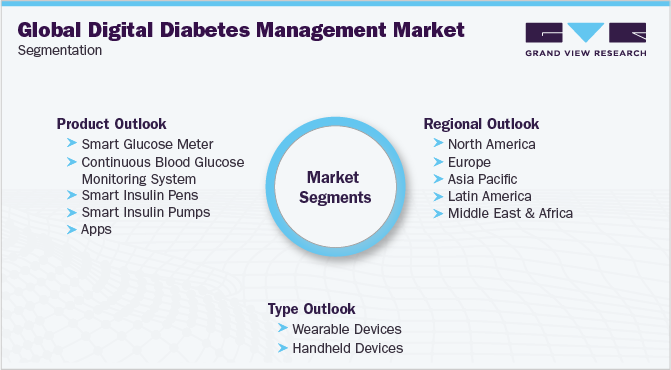
Digital Diabetes Management Market Size, Share & Trends Analysis Report By Product (Continuous Blood Glucose Monitoring System, Smart Insulin Pen), By Type, By Region, By End Use And Segment Forecasts, 2022 - 2030
- Report ID: GVR-3-68038-689-9
- Number of Pages: 110
- Format: Electronic (PDF)
- Historical Range: 2018 - 2020
- Industry:Healthcare
Report Overview
The global digital diabetes management market size was valued at USD 11.15 billion in 2021 and is expected to expand at a compound annual growth rate (CAGR) of 8.0% from 2022 to 2030. The robust growth of the market is majorly attributed to the growing prevalence of diabetes, coupled with technological advancement and innovation. For instance, according to the International Diabetes Federation, approximately 536,600 adults were living with diabetes in 2021 and this number is expected to reach 783,700 in 2045. As digital technology is continuously advancing, the market is expected to witness a wide range of innovations within the diabetes space, which has the potential to change the way we manage the disease. The number of smartphone apps available for the management of the disease has increased over the last few years, and there are over a hundred apps available on web-based app stores that can help patients monitor their blood glucose levels.

The rapidly changing lifestyles such as smoking and consumption of alcohol are contributing to the rise in the number of diabetes patients worldwide. Moreover, obesity is one of the major factors contributing to diabetes. The market for diet and weight management apps is showing great potential with the growing obese population, coupled with increasing awareness among patients.
Diabetes is a clinical condition where the inability of the pancreas to produce insulin causes an increase in glucose levels in the body. Diabetic patients face many daily challenges such as knowing what to eat, understanding medical advice, and the impact of food and activity on sugar. The anytime-anywhere nature of digital technology enables patients to address their health issues by connecting with the healthcare team and sharing data. This is creating a digital ecosystem of data-driven tools that can connect patients and their care team for better management of diabetes.
The COVID 19-pandemic has positively impacted the growth of the digital diabetes management devices market. The management of blood glucose levels became a critical task for patients admitted to hospitals with severe lung infections. Medications used to treat the disease led to a significant change in patient blood glucose levels. Moreover, the Center for Disease Control and Prevention highlighted that people who are living with diabetes and have been diagnosed with COVID-19 were admitted to critical care. Hence, the need for using diabetes management devices significantly increased.
Product Insights
The continuous blood glucose monitoring system segment held the largest revenue share of over 40.0% in 2021, owing to its advanced features such as compatibility with smart devices that serve as display devices. Moreover, it can be set to send custom alerts to patients when certain glucose thresholds are reached. Based on the product, the market has been segmented into smart glucose meters, continuous blood glucose monitoring systems, smart insulin pens, smart insulin pumps, and apps.
The smart insulin pens segment is expected to expand at the fastest rate of 11.2% during the forecast period. The high growth of the segment is majorly attributed to the increasing number of product launches and the advent ofartificial intelligence. Many players are focusing on innovating smart insulin pens, expanding their presence, and increasing product offerings, which is driving the market. For instance, in March 2022, Novo Nordisk launched smart insulin pens in the U.K. Patients receiving care for diabetes through the NHS now have access to the first-ever monitoring and recording technology.
Type Insights
Wearable devices held the largest revenue share of over 55.0% and the segment is expected to expand at the fastest CAGR during the forecast period. The growth of the market is majorly attributed to technological advancements such as the advent of artificial intelligence, the launch of new products such as closed-loop pump systems and smart insulin patches, and the growing adoption of self-insulin delivery devices in diabetes management. Based on type, the market has been segmented into wearable and handheld devices.

手持设备市场举行了一个相当大的revenue share in 2021 and the growth of the segment is primarily attributed to technological advancements and new product launches. The handheld diabetes devices can measure and record blood glucose levels, calculate how much insulin has to be given to the patient, receive patient data via a user interface, archive patient data, and perform other activities. In June 2018, Insulet Corp received FDA approval for its handheld dash system. The device is a touch screen personal diabetes manager with Wi-Fi connectivity that allows the software to be remotely updated.
Regional Insights
North America dominated the market in 2021 with a revenue share of over 35.0% due to the availability of advanced technologies and the recent approval of many digital blood glucose patient monitoring devices. For instance, in January 2022, Insulet Corporation announced that it has received clearance from the U.S. FDA for its Omnipod 5 Automated Insulin Delivery System, which integrates with Dexcom G6 Continuous Glucose Monitoring (CGM). It facilitates remote patient monitoring and data transfer through Omnipod 5 mobile app with its integrated SmartBolus Calculator. Furthermore, the increasing geriatric population and the growing burden of diabetes due to lifestyle changes are expected to boost the market growth.

Asia Pacific is expected to witness exponential growth during the forecast period owing to new product launches, a large diabetes population base, and increasing government initiatives. For instance, in January 2022, The Australian Centre for Accelerating Diabetes Innovation (ACADI) at the University of Melbourne announced that it would be granted USD 10 million over 4 years by the federal government. The ACADI will be a new virtual research center that will connect research centers around Australia and help important industry partners and organizations in the development of new therapies, technology, and behavioral interventions to address issues related to diabetes in the country.
Key Companies & Market Share Insights
Major market players are focused on adopting new technologies and introducing advanced products, taking advantage of important cooperation activities, and exploring acquisitions and government in order to offer better services to their customers and strengthen their presence in the market. For instance, in May 2021, Ascensia Diabetes Care announced the launch of GlucoContro.online, which is a browser-based diabetes management and analytics platform that provides data-driven care for people who use one of the Contour blood glucose monitoring meters. In September 2020, Ypsomed AG partnered with Dexcom, a market leader in CGM systems. This partnership was intended to make data from Dexcom G6 CGM devices available in the Ypsomed application in a smart device. Some prominent players in the global digital diabetes management market include:
Abbott Laboratories
Medtronic plc
F. Hoffmann-La Roche Ltd.
Bayer AG
Lifescan, Inc.
Dexcom, Inc.
Sanofi
Insulet Corporation
Ascensia Diabetes Care Holdings Ag
B Braun Melsungen AG
Digital Diabetes Management MarketReport Scope
Report Attribute |
Details |
Market size value in 2022 |
USD 11.80 billion |
Revenue forecast in 2030 |
USD 21.90 billion |
Growth rate |
CAGR of 8.0% from 2022 to 2030 |
Base year for estimation |
2021 |
Historical data |
2018 - 2020 |
Forecast period |
2022 - 2030 |
Quantitative units |
Revenue in USD million/billion and CAGR from 2022 to 2030 |
Report coverage |
Revenue forecast, company ranking, competitive landscape, growth factors, and trends |
Segments covered |
Product, type, region, end Use |
Regional scope |
North America; Europe; Asia Pacific; Latin America; Middle East & Africa |
Country scope |
U.S.; Canada; Germany; U.K.; France; Italy; Spain; Japan; China; India; Australia; South Korea; Brazil; Mexico; Argentina; Colombia; South Africa; Saudi Arabia; UAE |
Key companies profiled |
Abbott Laboratories; Medtronic plc; F. Hoffmann-La Roche Ltd.; Bayer AG; Lifescan, Inc.; Dexcom, Inc.; Sanofi; Insulet Corporation; Ascensia Diabetes Care Holdings Ag; B Braun Melsungen AG |
Customization scope |
Free report customization (equivalent up to 8 analyst’s working days) with purchase. Addition or alteration to country, regional & segment scope |
革命制度党cing and purchase options |
Avail customized purchase options to meet your exact research needs.Explore purchase options |
Global Digital Diabetes Management Market Segmentation
This report forecasts revenue growth at the global, regional, and country levels and provides an analysis of the latest industry trends and opportunities in each of the sub-segments from 2018 to 2030. For the purpose of this study, Grand View Research has segmented the global digital diabetes management market report on the basis of product, type, end useand region:

Product Outlook (Revenue, USD Million, 2018 - 2030)
Smart Glucose Meter
Continuous Blood Glucose Monitoring System
Smart Insulin Pens
Smart Insulin Pumps
Apps
Digital Diabetes Management Apps
Weight & Diet Management Apps
Type Outlook (Revenue, USD Million, 2018 - 2030)
Wearable Devices
Handheld Devices
End Use Outlook (Revenue, USD Million, 2018 - 2030)
Hospitals
Home settings
Diagnostic Centers
Regional Outlook (Revenue, USD Million, 2018 - 2030)
North America
U.S.
Canada
Europe
Germany
U.K.
France
Italy
Spain
Asia Pacific
Japan
China
India
Australia
South Korea
Latin America
Brazil
Mexico
Argentina
Colombia
Middle East & Africa
South Africa
Saudi Arabia
UAE
Frequently Asked Questions About This Report
b.The global digital diabetes management market size was estimated at USD 11.15 billion in 2021 and is expected to reach USD 11.80 billion in 2022.
b.The global digital diabetes management market is expected to grow at a compound annual growth rate of 8.0% from 2022 to 2030 to reach USD 21.90 billion by 2030.
b.North America dominated the digital diabetes management market with a share of 38.8% in 2021. This is attributable to the increasing penetration of smart consumer devices and innovation in AI-based services.
b.一些关键球员操作在数字糖尿病management market include Abbott Laboratories; Medtronic plc; F. Hoffmann-La Roche Ltd; Bayer AG; Lifescan, Inc.; Dexcom, Inc.; Sanofi; Insulet Corporation; Ascensia Diabetes Care Holdings Ag; and B Braun Melsungen AG.
b.Key factors that are driving the digital diabetes management market growth include increasing technological advancements and rising FDA approval for innovative products.





